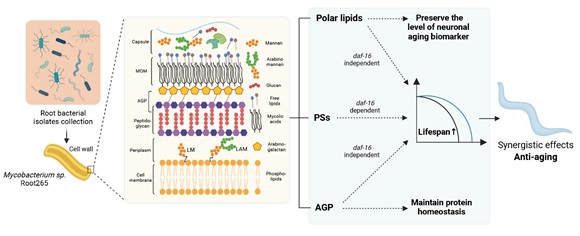The abundant and varied microbial communities within the human gastrointestinal tract play a crucial role in influencing both overall health and aging. The utilization of fecal microbiota transplantation (FMT) and probiotic supplementation has gained traction in disease therapy in human and prolonged lifespan in mice. Given the challenges regarding probiotic viability, localization, and potential drawbacks, microbial-derived molecules have emerged as promising therapeutic alternatives addressing these limitations.
Dr. TIAN Ye's group from the Institute of Genetics and Developmental Biology, Chinese Academy of Sciences, identified 8 genera of bacterial isolates from Arabidopsis root bacterial isolates could extend lifespan in C. elegans, and found that Mycobacterium sp. Root265 displayed the most pronounced extension effect. The study further identified three distinct lifespan-promoting molecules from Root265: water-soluble polysaccharides (PSs), water-insoluble arabinogalactan peptidoglycan (AGP), and organic polar lipids.
In this study, the researchers undertook an extensive investigation of bacterial isolates from natural bacteria reservoirs, specifically a collection of plant root-derived bacteria. Through the screen, the anthors successfully identified eight genera of bacterial isolates that robustly extend the lifespan of C. elegans. Of particular interest, Mycobacterium sp. Root265, a non-pathogenic soil bacterium, emerged as a standout candidate for its capacity to promote longevity and ameliorate age-related physiological deteriorations in C. elegans. Subsequent biochemical purification efforts led to the isolation of two key functional molecules within Root265—polysaccharides (PSs) and arabinogalactan peptidoglycan (AGP).
These molecules were found to exert their effects through distinct mechanisms, with AGP notably demonstrating a specific capacity to enhance protein homeostasis. Furthermore, another component, polar lipids originating from Root265, was shown to extend lifespan while mitigating age-related neuronal aging markers.
In summary, this study provides valuable insight into the potential bacteria and the bioproducts they yield, suggesting bacterial derivatives represent a promising alternative to direct microbial interventions for therapeutic strategies aimed at delaying the aging process.
This study entitled “The soil Mycobacterium sp. Promotes Health and Longevity through Different Bacteria-derived Molecules in Caenorhabditis elegans” was published online in Aging Cell (http://doi.org/10.1111/acel.14416) on November 19th, 2024.
Model for Mycobacterium sp. derived molecules promote health and longevity in C. elegans (Image by IGDB)
This work was supported by the National Key R&D program of China, the National Natural Science Foundation of China, the Strategic Priority Research Program of the Chinese Academy of Sciences, the CAS Project for Young Scientists in Basic Research and the New Cornerstone Science Foundation through the XPLORER PRIZE .
Contact:
Dr. TIAN Ye
Institute of Genetics and Developmental Biology, the Chinese Academy of Sciences
Email: ytian@genetics.ac.cn
 Model for Mycobacterium sp. derived molecules promote health and longevity in C. elegans (Image by IGDB)This work was supported by the National Key R&D program of China, the National Natural Science Foundation of China, the Strategic Priority Research Program of the Chinese Academy of Sciences, the CAS Project for Young Scientists in Basic Research and the New Cornerstone Science Foundation through the XPLORER PRIZE .Contact:Dr. TIAN YeInstitute of Genetics and Developmental Biology, the Chinese Academy of SciencesEmail: ytian@genetics.ac.cn
Model for Mycobacterium sp. derived molecules promote health and longevity in C. elegans (Image by IGDB)This work was supported by the National Key R&D program of China, the National Natural Science Foundation of China, the Strategic Priority Research Program of the Chinese Academy of Sciences, the CAS Project for Young Scientists in Basic Research and the New Cornerstone Science Foundation through the XPLORER PRIZE .Contact:Dr. TIAN YeInstitute of Genetics and Developmental Biology, the Chinese Academy of SciencesEmail: ytian@genetics.ac.cn CAS
CAS
 中文
中文




.png)
